The Book of the Order of Chivalry (c. 1275), was written by Ramon Llull (1232–1315), a polymath and Christian mystic from Majorca. Llull thought that knights should be chosen, trained, and ordained like priests. Llull’s book became a handbook of chivalry throughout much of Europe. Being a Christian mystic, of course he writes about Chivalry using Christian vocabulary. But I think his ideas transcend any particular Spiritual Tradition.
Llull wrote over 250 books on a wide range of subjects, including theology, philosophy, logic, science, and even poetry. (And one on Chivalry!) He is best known for his book Ars Magna — a groundbreaking philosophical and logical system that aimed to uncover universal truths using mathematics — now considered the invention of Mathematical Combinatorics. He was also known for his interest in memory and logical systems more generally: his method of linking virtues to physical objects is an example of the ancient memory technique known as the Memory Palace.
An overview of the Order of Chivalry, and a linked table of contents to all my blogs (with music) on various chapters of Llull’s book can be found here.
![]()
Llull’s The Order of Chivalry begins with a story — which I’ve lightly paraphrased from Old English into modern English (leaving some of the Old English flavor) from William Caxton’s 1484 translation of Llull’s original Catalan:
Once upon a time, there was a wise knight who had long upheld the Order of Chivalry, by the strength and nobility of his high courage and wisdom, and in risking his body had endured wars, jousts, and tournaments, and in many battles had had many noble and glorious victories. And in time he saw and thought in his heart that he might not long live, as he was for a long time and the course of nature near to his end. So he retired to become a hermit. For nature failed him in old age, and he no longer had the strength to use arms as he was accustomed. So he gave his inheritance and riches to his children, and made his habitation or dwelling place in a green wood, having abundant water and great and high trees, bearing fruits of various types. And he fled the world because of the feebleness of his body in which he was fallen by old age, to not dishonor the honorable things and adventures with which he had for a long time been honored.
The same knight thought on death, remembering the departure from this world into the next, and also thinking of the right redoubtable sentence of our Lord to which he must come on the Day of Judgment.
In one part of the wood was a fair meadow, in which was a tree well-laden and full of fruit. And under the same tree was a fountain most fair and clear, that aroused and moistened all the meadow.
And in that same place was the knight accustomed to come every day to pray and adore God Almighty, to whom he gave thanks for the honor that had been done to him in this world all the days of his life.
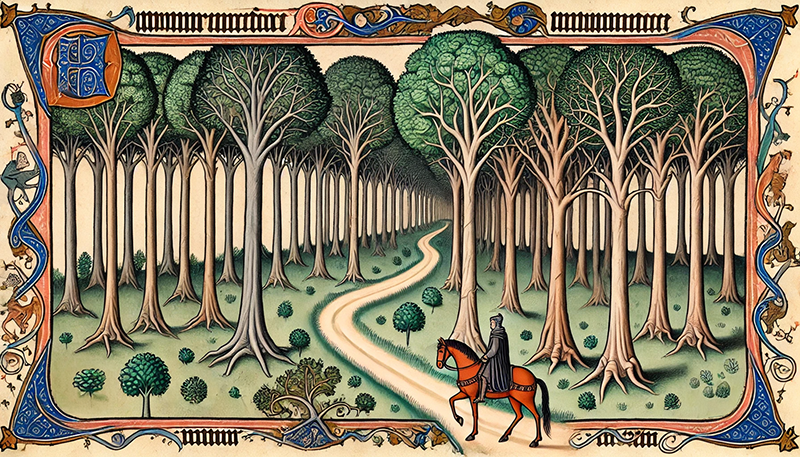
In that time it happened at the beginning of a strong winter, that a king most noble, wise, and full of good customs, sent for many nobles to hold a great court.
And by the great renown that was of this court, it happened that a squire was moved to go there, his intention being that he should be made a knight.
Thus as he went all alone, riding upon his palfrey [a gentle horse, not a battle steed] it happened that for the fatigue that he sustained from riding, he fell asleep on his horse. While he was sleeping, his palfrey wandered from the path and entered into the forest where was the Hermit Knight.
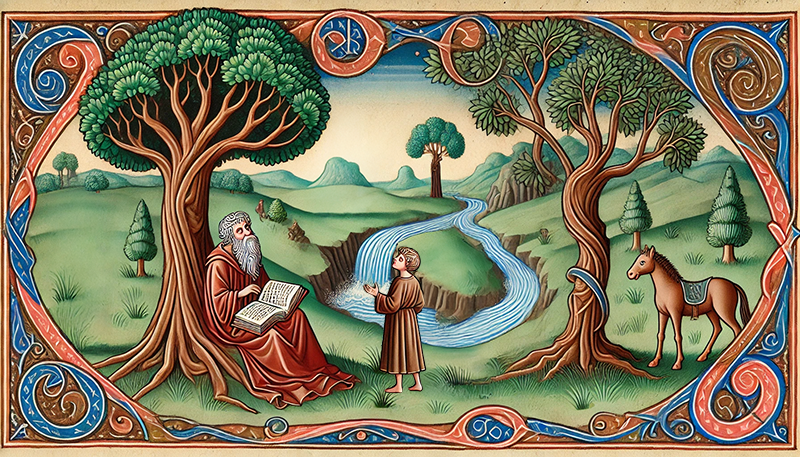
And in time he arrived at the fountain at the same time that the Knight who dwelt in the wood to do his penance, came there to pray to God, and to despise the vanities of this world, as he was accustomed to do every day.
When he saw the Squire come, he left his prayer and sat in the meadow in the shadow of a tree, and began to read in a little book that he had in his lap. And when the horse came to the fountain he began to drink, and the squire that slept felt that his horse no longer moved and lightly awoke, and then to him came the Knight who was very old, with a great beard, long hair, and a feeble gown worn and broken from long wearing, and by the penance that he daily made was much discolored and lean; and by the tears that he had wept his eyes were hollow, and he had the regard or countenance of a very holy life.
Each of them marveled at the other; for the Knight, who had long been in his hermitage, had seen no man since he had left the world, and the Squire marveled how he was come to that place.
Then the Squire descended from his palfrey and saluted the Knight, and the Knight received him most graciously, and then they sat on the grass one by the other. And before either of them spoke, each of them beheld the other.
The Knight knowing that the Squire would not speak first, because he would do him courtesy, spoke first and said,
“Fair friend, what is your courage or intent? And where are you going? Why do you come here?” “Sire”, said he, “the renown is spread by far countries that a king, most wise and noble, has commanded a general court, and therefore I go to his court to be dubbed a knight. But when I was asleep, for the travail that I have had from the great journeys that I have made, my palfrey went out of the right way, and has brought me to this place.”
When the Knight heard mention of the Knighthood and Chivalry, and remembered the Order of the same, and of that which pertains to a knight, he cast out a great sigh and entered into a great thought, remembering the honor in which Chivalry had been long maintained.
In the meanwhile that the Knight thus thought, the Squire asked of him why he was so pensive.
And the Knight answered him,
“Here are some of my thoughts on the order of Knighthood or Chivalry, and of the greatness in which a knight is duty-bound to maintain the greatness of the honor of Chivalry. Then the Squire prayed to the Knight that he would explain to him the order and how men could better honor and reverence it, as it ought to be after the ordinance of God.”
“How, son,” said the Knight, “do you not know what is the rule and order of Knighthood? And I marvel how you dare demand Chivalry or Knighthood before you understand the Order; for no knight may not love the Order, nor that which appertains to his Order, unless he knows the faults that he might do against the Order of Chivalry. Nor can a knight make other knights, unless he himself knows the Order. For a disorderly knight is he that makes a knight, and cannot show the Order to him in the custom of Chivalry.”
In the meanwhile that the Knight said these words to the Squire who demanded Chivalry, without knowing what was Chivalry, the Squire answered and said to the Knight, “Sire, if it be your pleasure, I beseech you that you will say and explain to me the Order of Chivalry, for it seems to me that I should learn it because of the great desire I have for it, and
after my power I shall embrace it, if it please you to assign, show and teach it to me.”
“Friend,” said the Knight, “the Rule and Order of Chivalry is written in this little book that I hold here in my hands, in which I read and am busy sometimes, to the end that it makes me remember or think on the grace and bounty that God has given and done to me in this world because I honored and maintained with all my power the Order of Chivalry; for in the same way Chivalry gives to a knight all to which he aspires, in the same way a knight ought to give all his strength to honor Chivalry.”
Then the Knight gave to the Squire the little book.
And when he had read it, he understood that one knight only among a thousand persons is chosen worthy to have more noble of that little book the Rule and Order of Chivalry.
And then he remembered him a little, and after said, “Ah, sire, blessed are you that have brought me in place and time that I may have knowledge of Chivalry, which I have long time desired, before I knew the nobleness of the Order, or the honor in which our Lord God has set
all them that be in the Order of Chivalry.”
The Knight said, “Fair son, I am an old man and feeble, and may not live much longer, and therefore this little book, that is made for the devotion, loyalty and the ordinance that a knight ought to have in holding his Order, you shall bear with you to the Court to which you go, and to show to all of them that will be made knights.”
“And when you shall be a newly dubbed knight, and you return to your country, come again to this place, and let me have knowledge of those who have been obedient to the doctrine of Chivalry.”
Then the Knight gave to the Squire his blessing; and took leave of him, and took the book most devoutly, and then mounted upon his palfrey and went forth hastily to the Court. And when he arrived he presented the book most wisely and devotedly to the noble king, and furthermore, he offered that every noble man that would be in the order of Chivalry might have a copy of said book, to the end that he might see and learn the order of Knighthood and Chivalry.
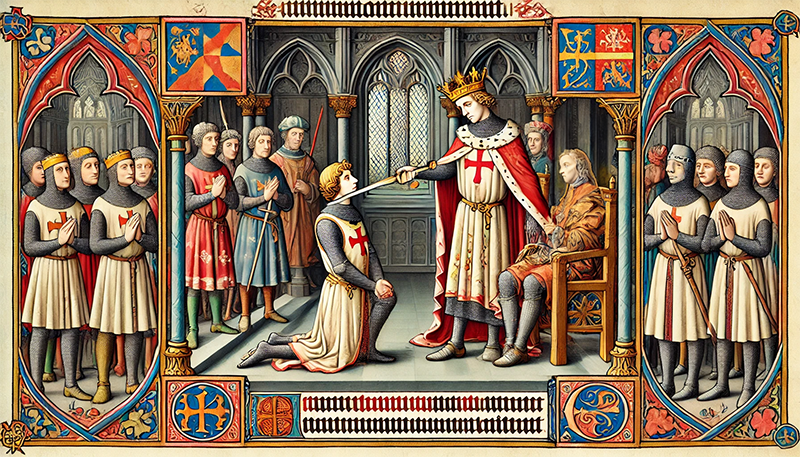
Llull’s tale ends here, but let’s continue the Squire’s story anyway:
So the Squire was knighted “Sir Elfred.” And the years passed, and he grew in prowess and nobility, defending the kingdom, protecting widows and orphans, helping the needy with his largess, and rescuing ladies in distress. Indeed, he became one of the most honored knights in the kingdom for his courageous and selfless service to God, king, and country. He also went on a Grail Quest, returning with wondrous books for the castle library and an otherworldy cast to his countenance, yet he would not speak of his adventures. He was also a skillful musician on diverse instruments, pleasing the court with his musical depth of soul.
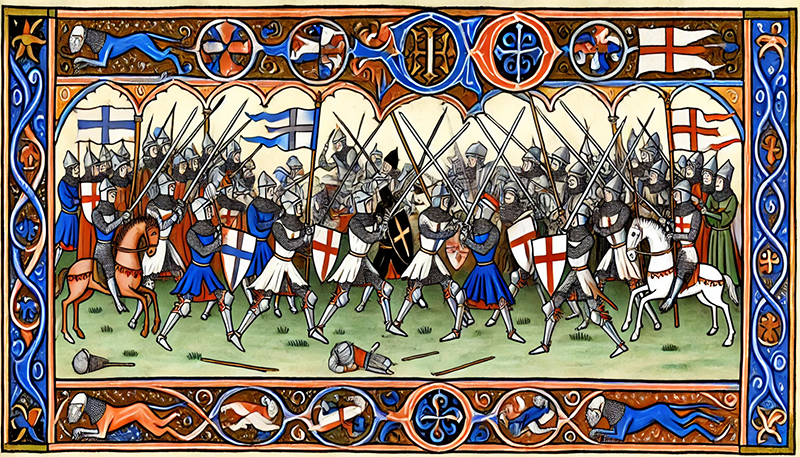
Alas, there came a battle in which Sir Elfred was blinded. In honor of his long and exemplary service, the king made him a court musician for life. To which Sir Elfred said, “Oh king, I am no longer able to protect the body of your kingdom with my bodily strength. So permit me to serve the soul of your kingdom with my art, with my music. Make me organist at your Grail Cathedral.” To which the king wholeheartedly consented. So Sir Elfred gave his armor, steed, weapons, and copy of The Order of Chivalry to a young squire, took on the habit of a lowly monk, and dedicated himself to the Grail Cathedral, praying with his voice and also with his fingers on the organ. And every Lord’s day, in the evening as the sun was setting, the cathedral would fill with people who came from near and far to hear the monk’s organ music inspire them to all that was true, noble, right, pure, lovely, and admirable.
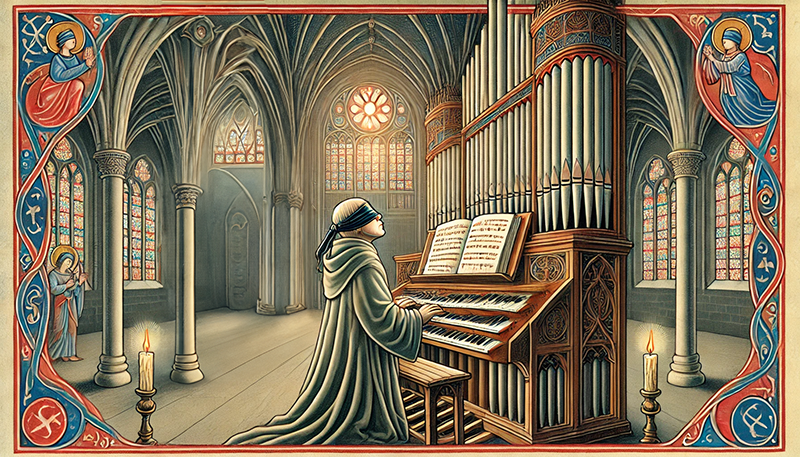


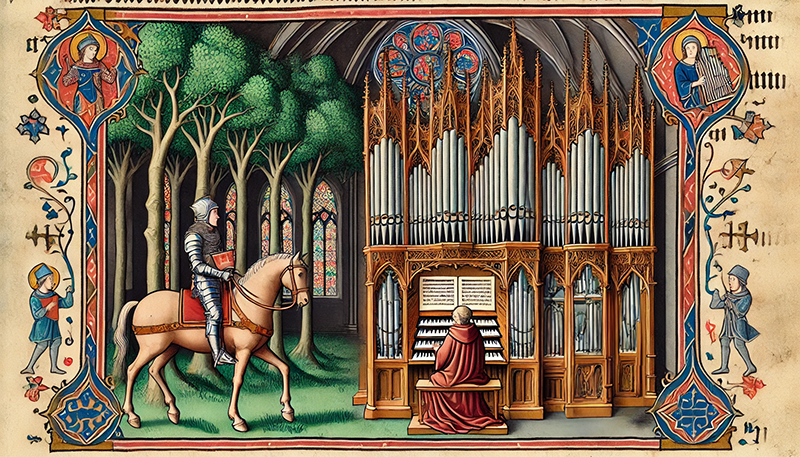
Leave a Reply